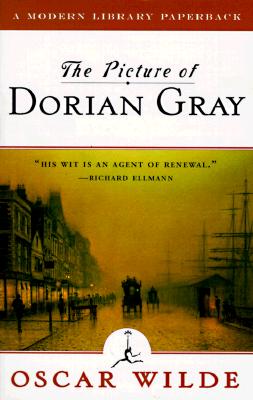by Oscar Wilde
Review by Dan Geddes
Wilde writes an intriguing play masquerading as both a novel and a morality piece. The best parts of Dorian Gray are Lord Henry’s sayings and witticisms, which stay charming even after they become predictable. Someone calls Harry the “prince of paradox” or something to that effect, and paradox is often the source of a Wildean epigram.
Although we feel that Harry is Wilde’s personal representative in the work, Wilde ultimately discredits him as an empty intellectual, and a bad influence on Dorian Gray. Dorian is perfect innocence until Harry whispers poisonous words in his ears; words that make Dorian fall in love with himself, and later to pray that the picture becomes old instead of himself.
It’s surprising that Wilde, the ultimate aesthete, would take such a view—the business about one’s soul rotting; he would seem to believe that even the profligate reveler should emerge from debauchery unpunished. Morality holds us back. Although the idea of the aging picture is quite memorable (I remember it even from 8th grade, and I didn’t read it then, a friend told me about it) I’m not sure what it means. Surely Dorian’s is a Faustian bargain; he shows us that one small evil will lead to greater evils.
Perhaps Dorian teaches us the dangers of coveting eternal youth. We shouldn’t desire such a thing; it is unnatural. We should embrace the various stages of life, the pros and cons of each. Dorian’s changelessness is unseemly, and the changeable portrait is equally uncanny.
Knowing the plot in advance, it’s difficult to evaluate the effectiveness of Wilde’s laying out the plot. Early on, I was more struck by Lord Henry’s wit than anything else. But the sudden cruelty of Dorian’s rejection of Sibyl Vane is incredible. It seems forced by Wilde’s need to make Dorian a poster-boy for Degenerate Aesthetes—he rejects her for her bad acting. Even though that’s why he loved her to begin with, I found it too sudden. But Wilde had to get the plot moving.
I liked the scenes where Dorian first discovered the sneering portrait, and the pains he takes to hide it. I found Dorian’s murder of Basil to be a little forced.
But Wilde is telling a morality tale. Obviously realism is not at the top of Wilde’s priority list.
In terms of the symbolic action: I especially like the central metaphor of the picture as soul; I like the Dorian’s hiding of his soul as a strong symptom of his evil; I like Wilde’s equating the Romantic book that Henry lends to Dorian as a further source of his degenerate ideas.
When he isn’t killing Basil, Dorian is a convincing enough character: the profligate bachelor, head of his household.
The Picture of Dorian Gray: Memorable Quotations and Descriptions
There are too many quotations to list. Dorian Gray is probably one of the most quoted works in English literature. Most of these lines are Lord Henry’s.
See especially the Preface for quotable quotes.
“Because to influence a person is to give him one’s own soul. He does not think his natural thoughts or burn with his natural passions. His virtues are not real to him. His sins, if there are such things as sins, are borrowed. He becomes an echo of some one else’s music, an actor of a part that has not been written for him. The aim of life is self-development. To realise one’s nature perfectly—that is what each of us is here for…” (28)
“Well, the way of paradoxes is the way of truth.” (43)
“Faithfulness is to the emotional life what consistency is to the life of the intellect—simply a confession of failures. Faithfulness! I must analyse it some day. The passion for property is in it.” (50)
Narrator: “There is a luxury in self-reproach. When we blame ourselves we feel that no one else has a right to blame us. It is the confession, not the priest, that gives us absolution.” (81)
Unfortunately, I didn’t pick out more. See the slim volume: Oscar Wilde: His Wit and Wisdom.
28 April 1999

